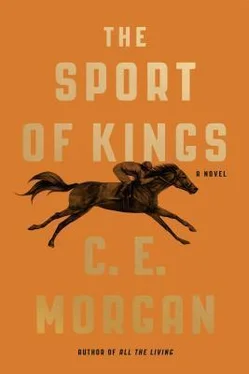His father spared a glance, his head notched to the side, but was slow to answer. “Ever since we arrived here,” he finally said. “After the Revolution, any man who came to this region and planted a crop of corn became the owner of that land.”
“And the corn was always for—”
John Henry held his tumbler aloft and pointed, the boy nodding. “Good bourbon. Good feed. In that order.”
“I think,” said Henry slowly, turning away slightly, gripping the porch banister and rocking as if he would almost launch himself rather than continue. “I think—”
“Don’t be indirect, Henry.”
“The farm will be mine someday.”
John Henry nodded once, but his tongue withheld assent.
“I’ve been thinking maybe when I’m older I’ll raise racehorses here instead of planting corn.” His voice rose in spite of itself, taking a kind of flight in lieu of his body, attached as it was to the banister by white-knuckled fists, and he was looking up as if his words had been directed to the expansive ear of the sky instead of his father. John Henry didn’t reply immediately, only looked at his son. Then he cleared his throat and with a voice low and pregnant with intent, like a man reading slowly from a family Bible, he said, “You are expressly forbidden to raise horses on this land.”
Henry’s head whipped round. “But—”
“You disappoint me, Henry,” he said. “You don’t speak up when you should, and you speak nonsense when you do. It makes me alarmed for the future.”
Henry’s eyes swam with instant, resentful tears.
His father shook his head. “I don’t want to speak about this tonight,” he said. “You know you can come to me whenever you have a real need, but you’ve interrupted my solitude, which I’ve earned, with what I frankly regard as an insult.”
He held up his free hand when the boy objected with a sound. “You don’t realize what the insult is, I recognize that. And I don’t fault you for it.” He laid a hand broad as a spade on Henry’s shoulder, turned him, so they faced squarely. He patted or cuffed him twice on the bone of the shoulder.
“We’ll talk soon. Good night,” he said, and he pointed toward the side door.
Henry turned and, without saying a word, slunk to the door.
“Henry,” his father said.
The boy turned.
“I said, good night.”
“Good night, sir.”
* * *
“He hates me,” he whispered in the half dark, lying there with her original, originating face too close, so she could discern the words on his lips. “Why does he hate me?” Lavinia laid a cool, dry hand over his mouth, but he went on speaking around her fingers, while she shook her original, originating head, no no no . He snatched her hand from his mouth.
“Who did he want if not me? What is it that I’m not? He never listens to me, he ignores me, he acts like he’s the king of everything!” Tears flooded him again, a young boy in an adolescent body. Still his mother didn’t answer, only shook her head and wagged a reproving finger.
“Do you love me?” he said, and she kissed him on the lips, hard. Then his cheeks and the adjutment of his chin.
“Mother,” he said, “what would you think if I raised horses here someday?”
She followed his lips and her face — watchful, elastic, overfull — suspended all hasty movement like a figure balancing. Her eyes quizzed him.
“I’ve seen something amazing!” he said. “Have you ever watched a horse being broken?”
She smiled a sorrowful smile and signed, When I was a girl, I saw a horse killed in the street. A drunk man shot his horse in the belly. Then someone else came and shot it in the head. In front of me .
“No, no,” said Henry, impatient. “When we were at the Osbournes’, I saw a horse being broken. Haven’t you ever just known something? I know something.”
A sad little smile emerged, and she took his face in both her hands. Her eyes said, Tell me what you know .
* * *
Behind the Forge house stood an apple orchard, planted a few hundred yards down the acreage in the direction of the bowl. It boasted a two-acre stand of Yates and Rome Beauty with a line of deep red Foxwhelp for cider making in the fall. The orchard was nothing but a headache for Maryleen one week of the year, usually October, but this time early November, because the apples had ripened later than expected. Now everyone was there in her kitchen— everyone : the boy; his mother, who had all the personality of a pillow; Filip, who was quiet, but mostly because he was drunk on white lightning, and everybody in Claysville knew it, because despite his haughty, stoic airs, he had a special talent for public intoxication at festivals and carnivals and whatnot. Apple-picking help even came from the field hands on occasion, because there were simply too many apples, more than any single person could manage. The garden Maryleen handled on her own; the green beans came in first and then tomatoes and the lettuce early and late, so the whole process was staggered, neatly terraced in time. She’d can what she could, freeze just a little in the icebox, but she never needed any help with that, and if she needed help, she wouldn’t ask for it, she just stayed late. That way she didn’t have to deal with people. That was her specialty, besides cooking — refusing to suffer fools, and most everybody was a fool in her book. When she’d first interviewed, she said with that gravelly voice of hers, “I don’t do child rearing.” She hadn’t said, I ain’t no Hattie McDaniel, you see two hundred pounds and a kerchief? She’d just kept that to herself and stuck to her intentions with the rigor of the devout. She only spoke to the child when he spoke to her, and she kept it to “yes” and “no” as often as not, and when nuance was called for, she said “Hmmmm” as if she were studying on it, which she wasn’t; she was thinking, Get thee thither, fool. The tall-dark-and-silent Filip, who was supercilious as hell for no reason except he was a colored man with someone he could actually lord over, tried to impress upon her the importance of learning to talk to the lady of the house in signs, because that was the respectful, Christian thing to do, damaged as she was and all. Well, Maryleen wasn’t about to do that, not today, not tomorrow, not ever. She could say yes and no with her hands, but she just begged off the rest. After all, didn’t they train dogs with hand signals? Better to communicate with nobody at all than to have them flap their hands at you like you were a golden retriever. “Oh no, can’t nobody teach me nothing,” she’d mouthed like some simpleton to the blonde lady, who always looked at you like she was the doe and you were the oncoming headlights, but the truth was Maryleen wasn’t here to talk to anyone. She wasn’t here to child rear, or make nice with some white lady, or play the role of kitchen slave to the pink toes and the Filips of the world. She was here to cook. And she was exceptionally gifted at it.
She’d come up in Claysville, the colored enclave, or what was left of it. The place was sagging on its foundations by the end of the war, which was to be expected. She always said, “You let a bunch of colored men run a town where there’s liquor to be had, and you might as well turn the keys over to the white folk.” What they should have done, if anybody’d had an ounce of brains, would have been to kick the menfolk out — make them live in shacks on the outskirts of town, only allowed in to deliver food or for population replacement (a disgusting but occasionally necessary allowance) — and let Claysville be run by the ladies. Then, voilà! It would become the Brooklyn of Kentucky, Brooklyn being her only reference to a once-little town that had done something with itself, high blackness intact. Or something like that. Her own mother could have run an army if she hadn’t been so tired when she came home from work every day. Too tired to be of any use as a mother. So Maryleen had taught herself to read. Well, a neighbor had taught her the letters and sounds, and then she’d figured out the rest. As a result, she’d always known she was smart. “Taught her own self to read,” her mother had always told everyone they ran into, as if that was something to brag about. But it had been simple, really, looking at the shapes, sounding them out, fitting them together. It was this drive toward sequential thought that made her a natural at solving mysteries. She’d begun reading them in the library when she was eight years old, and she could honestly say she hadn’t read one in ten years that she hadn’t figured out by the hundredth page. She always harbored the secret desire to write them when she retired — except what colored woman ever really retired? Anyway, she knew she was gifted. Everyone had thought she’d go to one of the colored colleges in Atlanta or Washington, D.C., which was not something anyone in Bourbon County did, everyone being the child of a farm laborer and whatnot, and she had in fact applied, because, like a peacock, she had some colors to show, but she’d turned them down flat when she received her acceptances. Aside from the getting-in part, she had nothing to prove to anybody — or so she told herself — and, besides, she already knew what she wanted to do. She wanted to cook. She’d taken every Home Economics class available to her (when she wasn’t reading her Shakespeare, her Dickens, her Dunbar and Hughes) and then her teacher, Miss Martin, had invited her home after school every day for two months to teach her more recipes and to talk to her, probably because she was a lonely woman getting on in years. Miss Martin had even taken her in for a whole summer when Maryleen’s mother was staying nights at her employer’s, because there was a child there that had cancer. It ended up dying in August, but Maryleen wasn’t sorry about that, because she had spent the best summer of her life at Miss Martin’s. She learned to make beef tenderloin with horseradish butter and fried chicken brined in Coke; also chicken divan, citrus Cornish hens, the best sweet pickle relish ever, chowchow, peach cobbler, derby pie, and bread pudding with whiskey sauce. It was during that baking and cooking, when Miss Martin’s conversation dwindled from current events to gossip to occasional rumination to companionable silence, that Maryleen’s mind became suddenly, startlingly free, and she realized it was here she could make her home, in this deep quiet, regardless of whether it was in some white folks’ house or in her parents’ home, where her father did nothing but read his Bible and ignore her, and her mother was sleeping every moment she wasn’t working. Silence was freedom.
Читать дальше
Конец ознакомительного отрывка
Купить книгу












